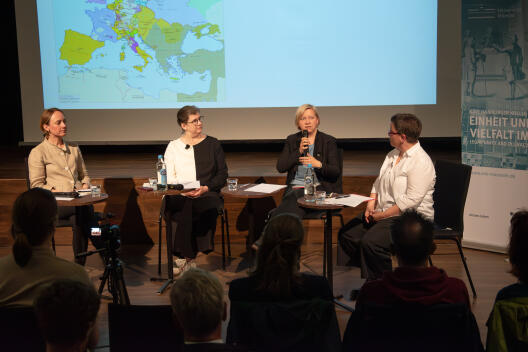Melting pot East-Central Europe

Panel discussion focussed on the history, religion and literature of a diverse region
On 5 June 2025, the Käte Hamburger Kolleg ‘Legal Unity and Pluralism’ hosted a panel discussion with the aim of connecting the centuries-old history of East Central Europe with its present and future. The discussion was moderated by EViR Director Prof. Dr. Ulrike Ludwig under the heading ‘Social diversity and legal plurality in East-Central Europe: looking back and forward’. She emphasised the need for new perspectives on the history of Europe. East Central Europe as a ‘melting pot’ with a long tradition of many social and religious groups living together offers an exciting basis.
Early modern historian PD Dr. Iryna Klymenko (Lviv) reminded the audience that concepts such as diversity and tolerance only emerged in the modern era and that new models were needed for the pre-modern era. She pointed out the ethnic, religious and legal diversity in cities such as Lviv. However, groups such as Poles, Ukrainians, Armenians or Jews were by no means equal in legal terms: ‘Inequality was created through law.’
Theologian Prof. Dr. Regina Elsner (Münster) shed light on the religious plurality of East Central Europe as a contact zone between Byzantine and Latin Christianity. Local religious identities were always formed here in contrast to others. Coexistence was also characterised by repression imposed by the ruling denomination.
The Slavicist Prof. Dr. Irina Wutsdorff (Münster) addressed the literary dimension, focusing on Bohemia and the re-Catholicisation after the Battle of White Mountain in 1620. She and Elsner discussed the role of language and denomination as markers of identity, particularly in connection with the rule of the Russian and Habsburg empires.
The experts agreed that historical depth is also essential for current debates. Wutsdorff pointed out that Ukrainian society is currently developing a more inclusive concept of nation that embraces different groups. Elsner called for the diversity of history to be taken seriously to counter manipulations and simplifications such as Moscow's imperial claims. Klymenko appealed to critically revisit the German culture of remembrance, which for too long had been blinded to the diversity of East-Central Europe by focussing on Russia. At the end of a stimulating and informative discussion, the aim of linking the history of the region with its present and future was certainly achieved.
Watch the recording of the event:

To play the video, it will be loaded from a Webserver of Google™ LLC. Therefore data will be transmitted to Google™ LLC.

